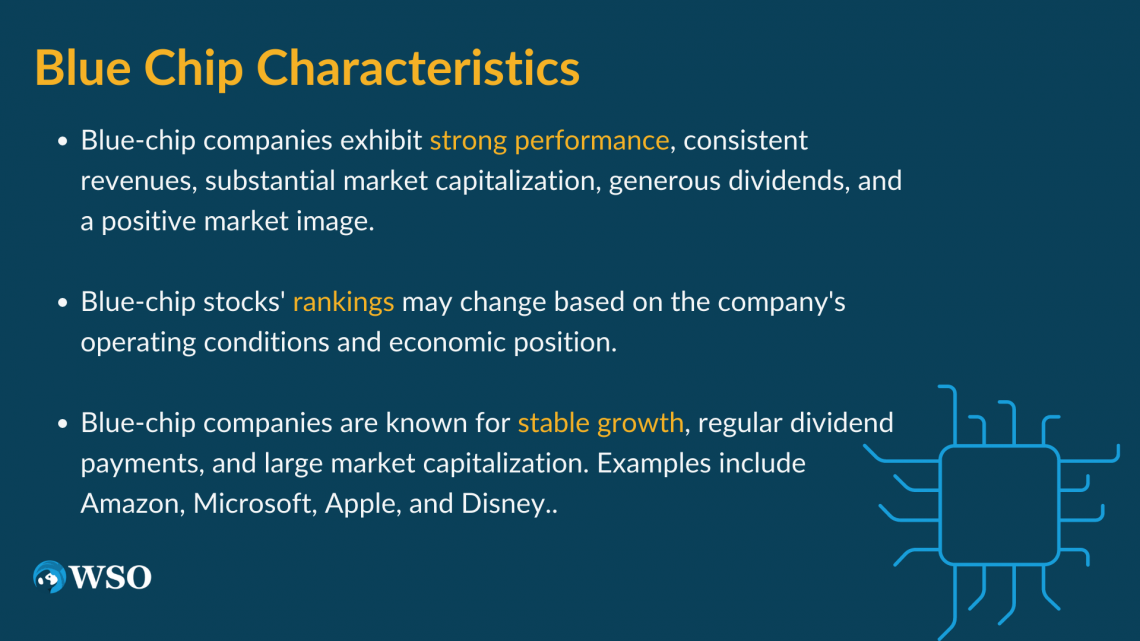Blue Chip
A company that is large, globally recognized and financially stable
What Is a Blue Chip?
If you usually invest or speculate in stocks, I believe you must have heard the term blue-chip stocks. We all know that blue-chip stocks are always tied to "stable + high value" compared to other stocks.

But what is this type of stock, exactly? What makes this stock a "blue chip"? This article will teach you all you need to know about this kind of stock.
Blue chips refer to any significant, mature businesses with long-term stable growth.
Casinos coined the term "blue chip." White, red, and blue are the three colors of chips used in casinos to signify different values. The most valued are the blues.
As a result, in the financial sector, "blue chip" refers to corporations with stronger operating performance and a consistent and bigger cash dividend payout.
Key Takeaways
-
Blue-chip stocks are significant, mature businesses with long-term stable growth, and the term originated from the casino's highest-value chips.
-
Blue-chip stocks are characterized by strong performance, consistent revenues, substantial market capitalization, generous dividends, consistent stock price trends, and a positive market image.
-
They offer stable growth and pay regular dividends, indicating stability and quality in their investments.
-
Blue-chip stocks are typically large-cap stocks but not all large-cap stocks are blue-chip stocks. They are industry leaders and associated with the country's pillar industries.
-
Examples of blue-chip stocks include Microsoft Corporation, Apple Inc., The Walt Disney Company, Amazon.com, Inc., and The Coca-Cola Company. However, the status of a blue-chip stock is not guaranteed and can change over time.
Blue Chip Characteristics
The term blue-chip often indicates a company with strong performance, consistent revenues, substantial market capitalization, generous dividends, consistent stock price trends, and a positive market image.

On the other hand, this type of stock isn't set in stone. The ranking of blue-chip stocks will alter when the company's operating conditions change and its economic position rises and falls.
According to the statistics of Forbes, among the 100 largest companies in 1917, only 43 companies' stocks were still among the blue-chip stocks by 2010.
Railway stocks, for example, which previously were the "bluest" and most profitable business, have completely lost their credentials and strengths to be picked as blue-chip companies.
1. Stable Growth
Blue-chip companies have a dependable history of consistent growth and promising futures. They might not be as eye-catching as rapidly expanding tech stocks, but that's because they've already made their mark.
2. Pay regular Dividends
Dividends are regular payments provided to investors from a company's profits. Companies that regularly pay dividends are often more stable; therefore, they might not need to reinvest as much in their growth.
Note
Earning dividends indicates a high-quality investment.
Reinvesting profits is a strategy used by certain reputable companies instead of distributing dividends. However, the shares of fraudulent and insolvent companies are not frequently dividend-paying stocks.
As a result, if you only invest in dividend-paying stocks, you will automatically steer clear of virtually all of the worst stocks on the market.
3. Large Cap
Blue-chip stocks are publicly traded corporations with a higher share capital and market capitalization. However, not all large-cap stocks are blue-chip stocks, making it difficult to establish a precise definition.
Large-cap blue chips are enterprises with a large market capitalization, reliable performance, industry leadership, and significant effect on the securities market.
Examples: Amazon.com, Inc. (NASDAQ: AMZN), Microsoft Corporation (NASDAQ: MSFT), Apple Inc. (NASDAQ: AAPL), and The Walt Disney Company (NYSE: DIS).
Understanding Blue Chip Stocks
Blue-chip stocks have earned a national reputation for the quality of their products or services, as well as their profitability and dependability beyond economic prosperity.

Large-cap stocks are not necessarily blue-chip stocks, but blue-chip stocks must be large-cap stocks.
In terms of market value, the Dow Jones Industrial Average (DJIA) businesses had a total market value of more than 3 trillion US dollars in February 2004, with an average market value of more than 100 billion US dollars. This is nearly equivalent to the GDP of a medium-sized country for a year.
Companies in the pillar industries of the national economy do not always have blue-chip stocks, but blue-chip stocks do not emerge from marginal industries.
Blue-chip stocks are more than just "stocks"; they also represent "industry and people's livelihood" As a result, all blue-chip stocks are associated with the country's pillar industries, and blue-chip businesses are industry leaders.
Some businesses function and perform admirably, but based on the characteristics of the industry in which they operate; they are not blue-chip stocks. Pillar industry stocks have the same qualities as blue-chip businesses.

The well-known Wal-Mart and McDonald's are regarded as blue-chip corporations in industrialized countries.
Blue-chip stocks aren't those whose assets have been reorganized. Generally, when a company's assets are restructured, its performance improves dramatically. However, it is not the same as growth.
The profit development generated by the company's beneficial resources based on advantageous management is represented in the growth of blue-chip stocks.
We must identify the formation of a new economic entity when a corporation has restructured its assets. Its expansion is also reflected in the development of new entities rather than the transformation of existing entities.
Example of Blue Chip Companies
Let's look at some well-known blue-chip stocks currently on the market to better understand what classifies as blue-chip.

It is worth noting that the examples given in this article may not be applicable in a few years. As I said before, no company's stock can always be guaranteed to be blue-chip.
The stocks in these examples are, without exception, the most well-known stocks on the market today.
They are leaders in their respective industries, closely related to people's lives (from online shopping, entertainment, electronics, and software, to food and beverage); they have been stable since listing and are not easily affected by stock market volatility.
1. Microsoft Corporation (NASDAQ: MSFT)
Microsoft globally is one of the most popular firms. It is a multinational technology firm founded by Bill Gates and Paul Allen on April 4, 1975.

The firm is primarily involved in research and development (R&D), production, licensing and delivering various computer software services.
The company's most well-known and best-selling products are the Windows operating system and the Office software series. It is the world's largest distributor of computer software and the world's leading PC software developer.
Microsoft Corporation ranked 15th on the list of the world's most profitable firms in 2017. And ranked 4th on the list of the 2018 World Top 500 Brands. Microsoft is ranked third among Forbes' Top 100 Most Valuable Global Brands for 2020.
From the above rankings, we can find that Microsoft corporation meets all the definitions of a blue-chip stock:
- Large-cap stocks are not necessarily blue-chip stocks, but blue-chip stocks must be large-cap stocks.
- Companies in the pillar industries of the national economy do not always have blue-chip stocks, but blue-chip stocks do not emerge from marginal industries.
2. Apple Inc. (NASDAQ: AAPL)
Apple Inc. is a consumer electronics business based in the United States, founded by Steve Jobs, Steve Gary Wozniak, and Ron Wayne in 1976. Apple Computer Inc. was renamed Apple on January 9, 2007. It is headquartered in California.

On December 12, 1980, Apple went public, setting a record market value of $2.660 trillion in 2022.
In 2022, Apple was ranked 3rd on the Fortune 500 list. On September 30, 2013, Apple overtook Coca-Cola as the most valuable brand in the world. In 2014, Apple surpassed Google as the most valuable brand in the world.
Apple's market capitalization currently stands at $2.2 billion as of July 2022.
I believe everyone recalls the moment when Apple unveiled the iPhone 4, which marked a global shift in the concept of mobile phones. Apple's growth rate has been consistent and rapid, confirming the stock's status as a blue chip.
3. The Walt Disney Company (NYSE: DIS)
Walt Disney created the Walt Disney Company in 1923. Walt Disney Company film distribution brands include: Walt Disney Pictures, Touchstone Pictures, Hollywood Pictures, Miramax Films, 20th Century Studios, Pixar Animation Studios, Marvel Studios, and others.

Aside from movies and television, the Disney corporation is where every child's dream comes true: Walt Disney World Resort, Disneyland Resort, etc.
The Walt Disney Company was 9th on the Forbes Global Digital Economy 100 list in 2019. In 2020, it was placed fourth on Fortune's 2020 Global Most Admired Companies. Forbes 2020 Top 100 Global Brand Values was revealed in July 2020, and The Walt Disney Company was rated 7th.
Disney's status in the world has been unique since Walt Disney launched the company a century ago. It has made great achievements not only in film and television but also in amusement parks and tourist attractions.
As a result, we may be certain that Disney's stock is currently a blue-chip stock.
4. Amazon.com, Inc. (NASDAQ: AMZN)
Amazon, based in Seattle, Washington, is the world's largest online e-commerce platform. It was one of the first companies in the e-commerce business.

Founded in 1994, it was initially solely focused on online book sales. It has now grown to become the world's largest online retailer offering a wide range of products.
Millions of unique new, refurbished, and used items, such as books, movies, music, and games, digital downloads, electronics and computers, home and garden, health and personal care, sports and outdoor supplies, toys, autos, and industrial products, are available from Amazon and other merchants.
According to claims in the media, Amazon plans to launch over 3,000 satellites into low-Earth orbit in May 2022 to provide satellite Internet services. Jeff Bezos stepped down as CEO of Amazon in July 2021, and Andy Jassy took his place. Amazon is ranked No. 3 in the Fortune Global 500 list for 2021.
Shopping on Amazon has become a necessary part of many people's daily life. Amazon's share price has consistently been a blue-chip stock throughout the year.
5. The Coca-Cola Company (NYSE: KO)
Coca-Cola was founded on May 8, 1886, in Atlanta, Georgia, United States. After entering the twenty-first century, Coca-products Cola's are consumed by 1.7 billion people worldwide every day, with around 19,400 bottles of beverages being sold every second.

In 2016, The Coca-Cola Company was named third among the world's top 100 most valuable brands in October 2016. In 2018, Coca-Cola stated that it would buy Costa Coffee outright for $5.1 billion.
Coca-Cola was placed No. 7 in the World Brand Lab's "2018 Top 500 World Brands," released in 2018. Interbrand was ranked Coca-Cola No. 5 in the Top 100 Global Brands in October 2019.
In the meantime, the organization was ranked 12th on the Fortune Global Most Admired Companies list for 2020 on January 22, 2020.
Since its inception, Coca-Cola has been, without a doubt, the most well-known soft drink on the planet. As a result, the stock of a century-old company must be a blue-chip stock.
Researched and authored by Yiqing Qiao | LinkedIn
Free Resources
To continue learning and advancing your career, check out these additional helpful WSO resources:




or Want to Sign up with your social account?